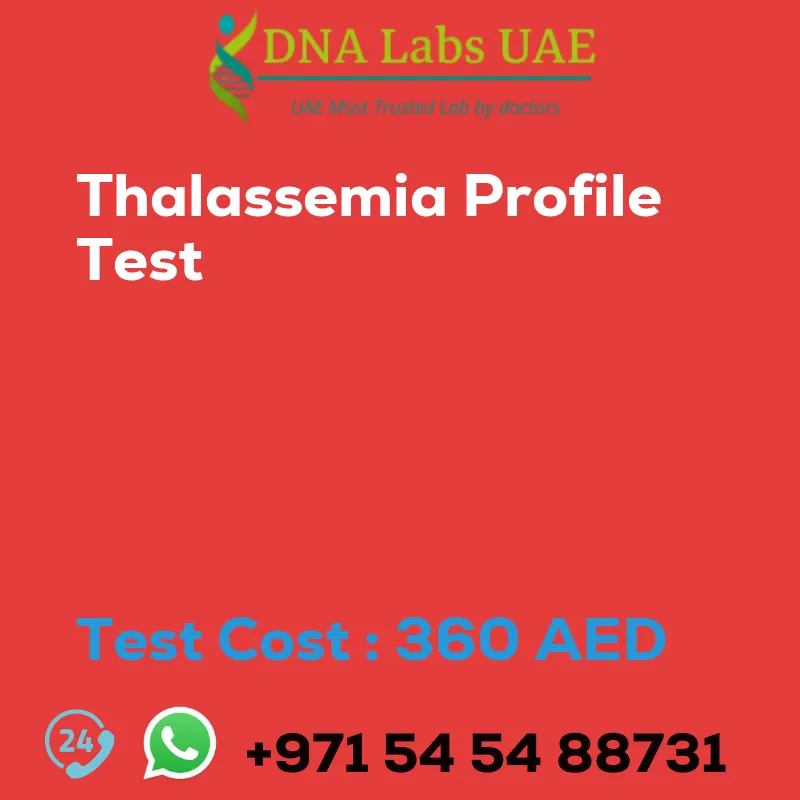Thalassemia Profile Test: Comprehensive Genetic Screening in the UAE
Introduction
The Thalassemia Profile Test is a comprehensive diagnostic assessment designed to detect and evaluate thalassemia, a genetic blood disorder. This test is a critical tool for individuals and families across the UAE, providing essential insights for managing health and planning for the future by identifying the type and severity of thalassemia.
What is the Thalassemia Profile Test?
The Thalassemia Profile Test is a specialized blood analysis that evaluates the presence and severity of thalassemia. Thalassemia is an inherited condition characterized by the body’s reduced or abnormal production of hemoglobin—the protein in red blood cells that carries oxygen. This leads to anemia and potential complications. The test analyzes several key components in your blood to provide a complete picture of your hemoglobin status and overall blood health.
Who is This Test For in the UAE?
This test is highly recommended for several groups within the diverse UAE community:
- Couples Planning for Marriage or Pregnancy: Provides crucial genetic information for family planning, especially important given the hereditary nature of thalassemia.
- Parents and Newborns: Helps in the early identification of the condition in children, allowing for timely management.
- Individuals with Unexplained Symptoms: Such as persistent fatigue, weakness, pale or yellowish skin, or signs of anemia.
- Individuals with a Family History: Anyone who has a known family history of thalassemia or related blood disorders.
- Those Seeking Detailed Insights Beyond Basic Screening: While the UAE has a mandatory premarital screening program, this comprehensive profile offers a more detailed analysis for those seeking deeper understanding.
What You Will Learn from Your Test Report
Your detailed report will include analysis from the following integrated components, providing a multi-faceted view of your blood health:
| Test Component | What It Measures | Key Insight Provided |
|---|---|---|
| Complete Blood Count (CBC) | Levels of red blood cells, white blood cells, platelets, and hemoglobin. | Identifies anemia and assesses the size and color of red blood cells, which are often affected in thalassemia. |
| Hemoglobin HPLC/Electrophoresis | Different types of hemoglobin present in the blood. | Separates and identifies normal and abnormal hemoglobin variants (like Hemoglobin A, A2, F, E, or S) to diagnose the specific type of thalassemia. |
| Iron Studies | Body’s iron levels, including serum iron and ferritin. | Evaluates iron status, which is vital as thalassemia can sometimes lead to iron overload, requiring specific management. |
How the Testing Process Works
Getting your Thalassemia Profile Test with DNA Labs UAE is a simple and streamlined process:
- Order & Schedule: Book your test online or via phone. You will receive clear pre-test instructions.
- Sample Collection: A professional phlebotomist collects a small blood sample from your arm at our clinic or through a convenient at-home service. The process is quick and follows Halal-compliant, medically approved methods.
- Advanced Laboratory Analysis: Your sample is analyzed in our accredited lab using advanced methodologies including Spectrophotometry, Electrical Impedance, VCS technology, and High-Performance Liquid Chromatography (HPLC).
- Expert Review & Report Generation: The results are compiled and reviewed. A detailed, easy-to-understand report is prepared.
- Report Delivery: You receive your confidential report the next day if your sample is provided by 9 am.
Thalassemia Profile Test Price
Comprehensive Test Fee: 360 AED
This all-inclusive price covers the full panel of tests, sample collection, analysis, and your detailed report. We believe in transparent pricing with no hidden costs.
Why Choose DNA Labs UAE?
Choosing the right partner for genetic and diagnostic testing is paramount. DNA Labs UAE is built on a foundation of trust, expertise, and local relevance:
- Internationally Recognized Quality: DNA Labs UAE is accredited under the ISO 9001:2015 Quality Management System for the provision of genetic and DNA testing services. You can view our ISO 9001:2015 certificate [PDF] as proof of our commitment to rigorous international standards.
- Local Expertise with a Global Standard: Based in Dubai Healthcare City, we combine deep understanding of the UAE community’s needs with world-class laboratory practices.
- Speed and Convenience: We provide fast, next-day reporting and offer flexible sample collection options to fit your busy lifestyle across the Emirates.
- Confidentiality and Compassion: We handle your sensitive health information with the utmost privacy and provide clear, compassionate communication about your results.
- Expert-Led Service: Your test is overseen by qualified hematologists, ensuring expert analysis and reliable results you can trust for informed decision-making.
Important Disclaimer
It is designed to provide insights into genetic predispositions and blood health indicators. This test is not a substitute for professional medical advice, diagnosis, or treatment. It is crucial to discuss your results and any health concerns with a qualified healthcare professional, such as a hematologist or your family doctor, who can provide personalized medical guidance and interpret the findings within the full context of your health.
Frequently Asked Questions (FAQ)
1. How is this test different from the mandatory UAE premarital screening?
While both are important, the mandatory premarital screening is a basic test to detect the presence of certain genetic blood disorders like thalassemia and sickle cell anemia. Our Thalassemia Profile is a comprehensive diagnostic test that provides a deeper analysis, identifying the specific type (alpha or beta) and severity of thalassemia, which is essential for detailed family planning and clinical management.
2. Is the blood collection method Halal?
Yes. The blood sample is collected through venipuncture (a standard needle draw from the arm), which is a medically necessary and permissible procedure. We adhere to the highest standards of ethical and professional medical practice.
3. How accurate is the Thalassemia Profile Test?
The test utilizes advanced laboratory technologies and is performed in an ISO 9001:2015 accredited facility, ensuring high levels of accuracy and reliability in the analysis of your blood sample.
4. Are my test results kept private?
Absolutely. DNA Labs UAE adheres to strict patient confidentiality and data protection policies. Your personal information and test results are kept completely private and secure, shared only with you or authorized individuals as per your directive.
5. Do I need to fast before the test?
Yes. For the most accurate results, overnight fasting is preferred, and sampling before 12 noon is recommended. You should also avoid iron supplements for a minimum of 24 hours prior to your blood collection.
6. How long does it take to get the results?
We offer a fast turnaround time. If your blood sample is received at the lab by 9:00 am, your comprehensive report will typically be delivered the next business day.
7. What if my test results indicate a risk or presence of thalassemia?
Your report will provide clear findings. We strongly recommend consulting with the referring doctor or a specialist hematologist who can explain the results in detail, discuss their implications, and guide you on the next steps, which may include further testing for family members, counseling, or management options.
8. Can this test diagnose other types of anemia?
While the primary focus is on thalassemia, the components of the test (like the CBC and Iron Studies) provide valuable information about your overall blood health and can help differentiate thalassemia from other causes of anemia, such as iron deficiency.







